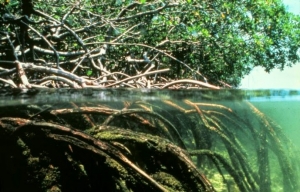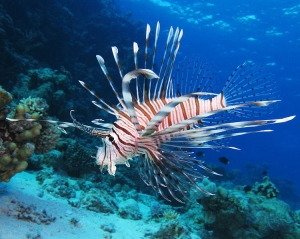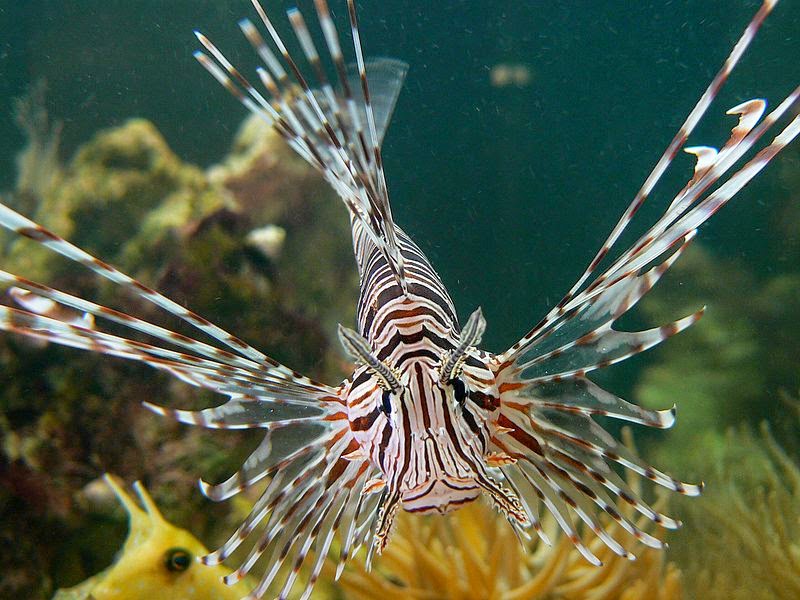If I end up falling in love with the coral reef ecosystem, there’s a good chance I’ll get my heart broken. It is so beautiful, so delicate, so complex, so exquisitely balanced—and under assault from so many directions. There is overfishing, there is acidity from atmospheric carbon, there is sea temperature rise from global warming, there is sea level rise from global warming. Developers mow down the mangrove forests that protect them from sediment runoff and they get buried. Nitrate pollution from agricultural runoff and sewage causes algae growth that smothers them and takes all their oxygen. And even ecotourism ain’t helping.
And now, as if they needed another problem, there are lionfish in the Caribbean.
Lionfish (Pterois volitans) are spectacular creatures. They are beautiful, they are unusual, they are magnificently talented predators, armed with dramatic, arching, venomous spines—and they don’t belong in the Atlantic, they belong in the Pacific.

Mangrove forests protect the reef from sediment runoff
Photo courtesy of NOAA, public domain, via Wikimedia commons
Legend has it that lionfish got introduced into the Atlantic when Hurricane Andrew destroyed a public aquarium in Florida in 1992 and its six lionfish ended up in Biscayne Bay, but actually they had been sighted before then. We can’t know, but probably it was thoughtless people giving up their aquarium hobby and tossing them into the ocean. In the last decade, they have gathered their momentum, and their numbers and their range are both absolutely exploding. The alarm you hear when you read up on it is frightening. Environmentalists are scared. The National Oceanic and Atmospheric Administration (NOAA) is scared. Mark A. Hixton of Oregon State University says it “could very well become the most disastrous marine invasion in history.”
They eat juvenile fish, and they’re very good at it. And coral reefs are tremendously important nurseries for juvenile fish. A lionfish can eat from twenty to thirty small fishes in just a half an hour. A single lionfish can reduce the juvenile fish population in his area by 79% in just five weeks. And there is a one-word answer to the question of why this threatens the entire reef and not just the fish population, and that word is balance.
I thought I’d seen some delicately-balanced ecosystems before I started reading up on coral reefs. Man, I didn’t know what delicately-balanced was. I’ll be writing more about coral reefs without a doubt, but one of the many hair-raising balancing acts that goes on out there every day is between the coral and the algae. Algal encroachment is devastating to coral reefs, and the small fish are the herbivores who keep the algae grazed back.
In the Indo-Pacific oceans where lionfish come from, they have predators. Groupers and several other fish will take them out, but the groupers on this side of the world don’t seem to know how to do it, and besides, we’ve overfished our groupers pretty badly. Also, in their native waters, the prey fishes all know what a lionfish is, and they flee from it. Some scientists think that one problem is that lionfish are so bizarre that no one around here knows what they’re looking at. They look strange and they hunt strangely. They herd fish into a corner with those pectoral spines and then nail them with a lightning strike. They blow water across their prey to disorient it, they have specialized swim bladders that they use for side-to-side motion, and their stomachs can expand to thirty times their normal size, with the result that they can gulp down something two thirds their own length. They’re outlandish, and the fish around here have never seen anything like them. They don’t look like a predator to their prey, and they don’t look like prey to their predators, so they get to sashay around doing what they want and gobbling everything up. Some divers are actually trying to train fish like sharks how to eat a lionfish, by feeding lionfish to them, but it hasn’t been real effective so far, and anyway, there’s argument about it. A lot of folks make the reasonable point that it’s probably a bad idea to teach sharks to associate humans with food.

Outlandish: No one in the Atlantic knows what to make of a lionfish
By Alexander Vasenin CC BY-SA 3.0 via Wikimedia Commons
But if there’s a bit of good news to be gleaned, it’s this: lionfish are very tasty.


If Pacific Grouper knows how to hunt Lionfish, might it be acceptable to introduce them? Or are they a different species, presenting their own risks?
It’s my impression (correct me if I’m wrong) that Groupers are fairly solitary and don’t hang out in schools, so they probably wouldn’t be “teaching” Atlantic Groupers to hunt Lionfish.
But might the concept be worth exploring, if not with Groupers, then with some other Pacific Lionfish predators?
Don’t know if it would work, but history has proven that it’s ALWAYS a bad idea to try to solve a problem by introducing a species.
Another note: Some engineers are designing an autonomous under-water drone that finds and kills lionfish. Here’s the article:
https://www.usatoday.com/story/news/nation-now/2017/06/30/lionfish-killing-robots-startups-drone-would-target-invasive-species/444917001/